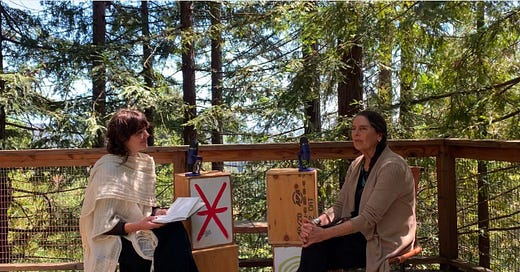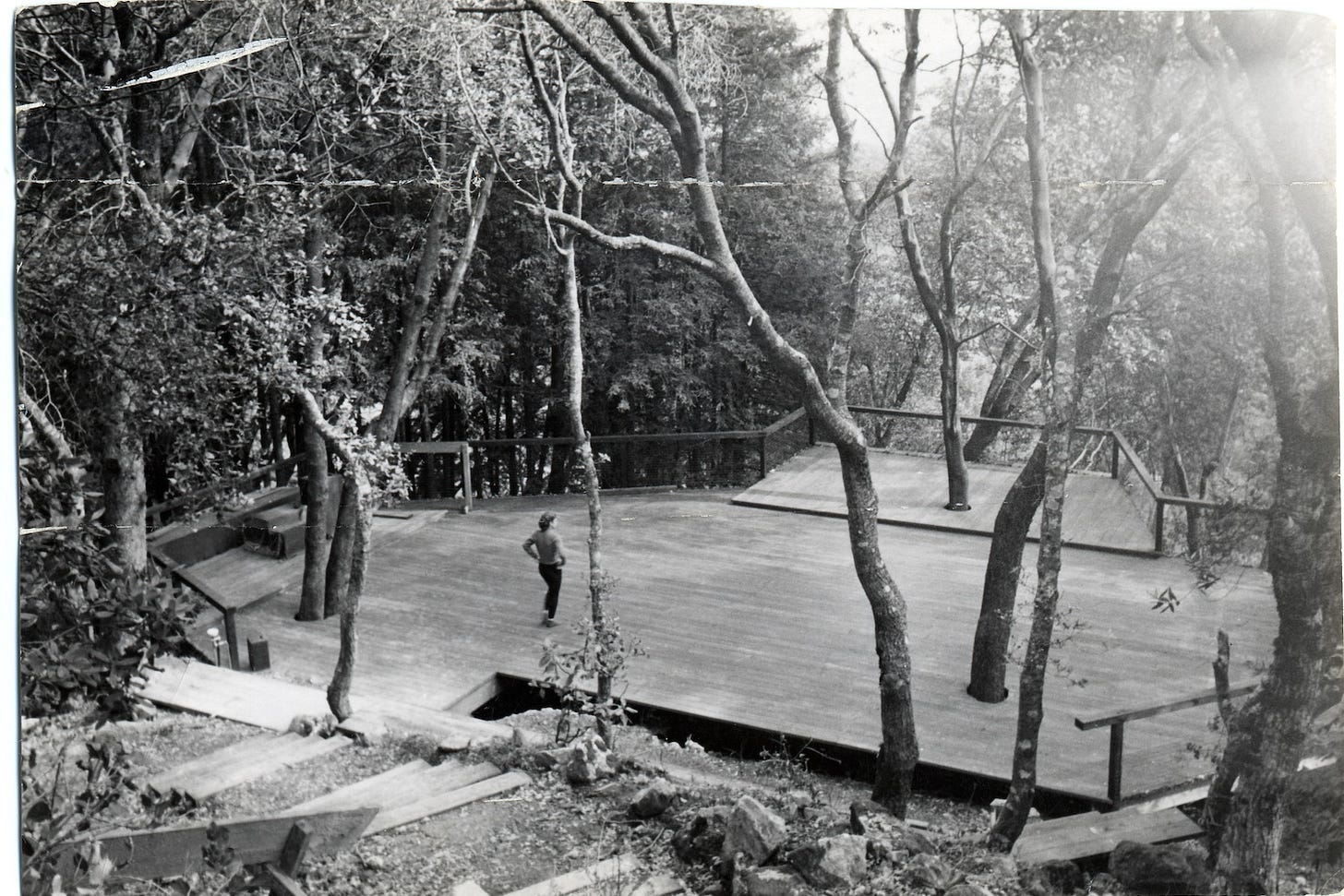What school never provided me, mentors did: I’ve learned more skills and more ways to think and be in the world from people I’ve spent time shadowing, than in 12 years seated behind a desk.
Daria Halprin the co-founder of the Tamalpa Institute, a dancer and a performer, is another living example of this. From the youngest age, both her artists parents and the people they’d collaborate with would play the role of mentors to her.
75 years later, she is on my podcast to share the tales of growing up in the 50s in the Bay Area with alternative parents, becoming a young dancer and touring with her mother’s company around Europe, and studying under some of the big names of the 20th century in psychology.
Here are some highlights of the transcript of our conversation, focused on what she has to say about mentors.
In our discussion, we also cover other forms of alternative education, healing through dance, and advice for people in their 20s. If you are interested in listening to it, do so on Spotify, Apple Podcasts, or enjoy the video on Youtube.
A creative education in the 50s in California
Daria: “My story started here in the woods, in the redwoods of Northern California, at the foot of Mount Tamalpais.
My parents were two alternative artists and designers, Anna and Lawrence Halprin, and they were also both lovers of nature. And so my childhood was infused with this beautiful place that we lived and grew up in, that is near San Francisco, but feels a little bit like it's awfully far away.
As a child, I grew up in an atmosphere that was filled with imagination and fantasy. And I danced on this beautiful dance deck.”
“Between hiking with my father and collecting flowers and learning about nature and dancing with my mother and running away from home with my sister into this beautiful redwood forest where we would play amongst the trees, that was a kind of a very remarkable childhood that I began with.
And that's not to say that that childhood wasn't filled with its own kind of difficulties, but it was very unique in that way, very, very alternative.
And so from childhood, in a way I think that I was mentored into an educational way of looking at life that had a profound connection to creativity and to nature.”
Parents as mentors?
Daria: “You know, when I think about my childhood, my parents were not only my parents, they were my mentors. [...] And so I had to differentiate between my parents as parents and my parents as educators.
And then, you know, as I got older, especially late teens and early 20s, I was able to find some mentors. And those mentors were the people that were most important to me. And that's where I learned the most, having those models of innovative thinkers and who I could learn from and fashion myself after in some ways.
I learned by making the mistakes that I made and by learning what I didn't know. And in some ways, I learned by imitating my mentors, people who I had watched working, who I was so inspired by.
And, okay, I'll do it like I saw them do it. And to some extent, that also includes a way that I mirrored my mother in her work. At the same time, I was really trying to find a different way, which also was helpful to have a frame of reference that she provided so that I could experiment with, "Okay, here's what I learned from her. Here's how I watched her work. Now I'm going to find my own way."
So I had a point of reference that was very important to move off of and to come back to.
And I think that that's an important way to understand mentorship as well, to mirror and to have a point of reference to move off of and come back to when you get lost and when you have questions.”
“As young people search for alternative ways to learn, that's really important:
Pay attention to the gifts and the passion that you have, you know, and where can you find mentorship and learning that will help you build on that, not just do what you know or even do what you feel, but build on it.
And so my way of doing that, because this is what I had available at the time, is that I started teaching and the studio and the students became my mentors.”
A therapist as a mentor
Zelda: “I want to go back to your teen years and to a chapter of your life when you've been an actress. [...] Could you tell us more about that?”
Daria: “I didn't look for it. It found me. That wasn't my dream. It found me because of my life as a dancer in the San Francisco Bay Area scene. I'd been in some documentaries. I was 18 years old. I was 17, 18 years old. I was studying at UC Berkeley and I wanted to go to college. I hadn't quite figured out what I wanted to do because, as I said, it wasn't my intention to make my life's work dance or theater even.”
[…]
“I went on a few auditions for films and I lived in Hollywood during that time. I didn't like it. I didn't like the atmosphere. I didn't like the culture. I hadn't made a decision to leave yet, but I wasn't comfortable there. It was so different than the environment that I was used to here in the Bay Area. I didn't know what I wanted to do. I had no idea what I wanted to do. I would say I was pretty lost at that time.
In a way, ultimately, it sent me back to my roots.
So, when I came back from my Hollywood experience, and my marriage to Dennis Hopper, which was quite traumatic, and that experience of really having lost my ground, almost entirely, and not knowing what to do next in having a little baby, which was terrifying, I realized that I needed therapy.
And so, I started that healing process for myself.
And I started working in therapy with a man named Robert Hall, who had been a senior student of Fritz's, Fritz Perls, and who developed an approach that integrated gestalt therapy with somatics and body work. […] We became close friends, and he became my mentor. And I worked with him very closely every week for a number of years, sometimes several times a week.”
A message for the youth
Zelda: “What would you say to young people that are listening to us who might feel lost with their path, who are maybe in high school or in their early 20s. What kind of message would you like them to hear?”
Daria: “Well, as we've been talking, I've been reminded of the importance of the mentors in my life. And looking back, I'm so touched by how important that was.
And to the extent that, "Oh, I wish I would have had even more time with that mentor, more time with that mentor." I would say that: find a mentor.
I think that the most valuable education we receive comes through the kind of teachers we have in our lives. Find the teacher who's right for you.
I wouldn't advise doing it all on your own. I think, one, it's lonely. And, two, there is so much knowledge out there.
Elders have so much to give, have so much knowledge and life experience to give. While I think it's wonderful to kind of innovate your own way as a young person, as I did, I think having an advisor or two or three is really, really important. And I never would have been able to innovate on my own if I hadn't had those mentors.
So that's what I would say.
Find mentors. Find elders.”

Hi! I’m Zelda. I spend my days building a school, teaching teens to become awesome adults, connecting hackers & creatives, and sharing wholesome stories on Twitter/X, my podcast, and in my newsletter. See ya!





Yes! Mentors may be one of the most underrated and unused sources of learning and growth. There is an award-winning mentorship program at Monte del Sol in Santa Fe, NM that my good friend Tony Gerlicz, school founder, established and guided starting in 1998. He is still part of that program.
https://www.montedelsolcharterschool.org/
Thought this might resonate - this is from Scroll 19 of my project The Hidden Clinic. I wrote it as a prayer—not a statement. Not for applause. Just rhythm for witness. https://thehiddenclinic.substack.com/p/to-the-ones-who-were-set-on-fire